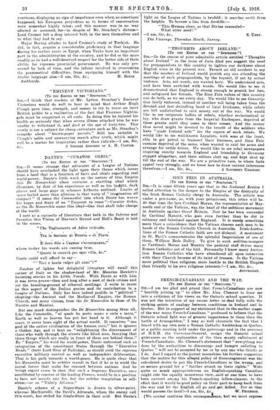DANTE'S " CURATOR ORBIS."
[To Tat Eorron OF THE " Specraeoa.") SIR,—It seems strange that advocates of a League of Nations should have overlooked the light upon their theme which issues from a land that is a fountain of facts and ideals regarding real: world-power. Dante's little work on the nature of true Empire (his De Monarchia) alone contains a startling ideal which illumines, by dint of his experience as well as his insight, dark places and large gaps in schemes hitherto outlined. Limits of space forbid more than allusion to that warp of " imegination all compact " (I mean the Commedia) into which Dante has woven his hopes and fears of an "Emperor to come "—Curator Orb is, as the De Monarchia Gums this ideal—One that shall take charge of the world.
I note as a curiosity of literature that both in the Inferno and Paradiso this Vision of Heaven's Hound and Hell's Beast is laid in the scenes, "Che Tagliamento ed Adice richiude.
Tra le lontane di Brenta e di Piave. E dove Lila e Cagnan s'aceompagna," where to-day his words are coming true, "Questi la caccerk per ogni villa, &c."
Dante could well afford to say- " Taci e lascia volger gli anni I " Readers of lighter but delightful literature will recall. this corner of Italy .as the shadow-land of Mr. Maurice Hewlett's hauntingetories in his Little Novels. With Dante as with him it was terra prava—then and long after a nest.of dark crimes and yet the breeding-ground of ethereal nestlings. I write to insist on this aepeet of the Italian genius and its contribution to a League of Nations. Italy has been indeed prolific in " political" offspring—the Ancient and the Mediaeval Empire, the Roman Church, and many visions, from the De Monarchic to those of De Maistre and -Mazzini.
But one mark distinguishes the De Monarchia among them all. Like the Conanedia, "el quale ha posto mano e Melo a terra," Earth as well as heaven has put her hand to it. Although it soars, it never loses sight of the actual world. It conceives "one goal of the entire civilization of the human race," but it ignores a Golden Age, and is bent on "enlightening the discernment of those who walk through the streets like blind -men, fancying that those things which are really in front of them are behind them." By " Empire," his word for world-power, Dante understood such an integration of the constituent States through the "Executive Heads" (tests Lord Grey of Fallodon), as should yield the supreme executive military control as well as independent deliberation. That is his path towards a world-peace. He is quite clear that his Monarchs must be arbiter mundi in fact if he -is to wield the moral forces that make for concord between nations. And he brings cogent cause to show that such a Supreme Executive, once constituted by consent of the leading Powers, would be in a position to face, not merely any foe, but the subtler temptation to self- abuse,—or an "Unholy Alliance."
Dante's scheme of a Super-State is drawn in silver-point, whereas Machiavelli, the Devil's Advocate, -whom the enemy call into court, has etched his Single-State in their acid. But Dante's light on the League of Nations is twofold : it searches earth from the heights. To borrow a line from Sordello:—
"This Human clear, as that Divine concealed— What utter need! "
—I am, Sir, &c., S. Mier.
The Vicarage, Thornton Heath, Surrey.










































 Previous page
Previous page